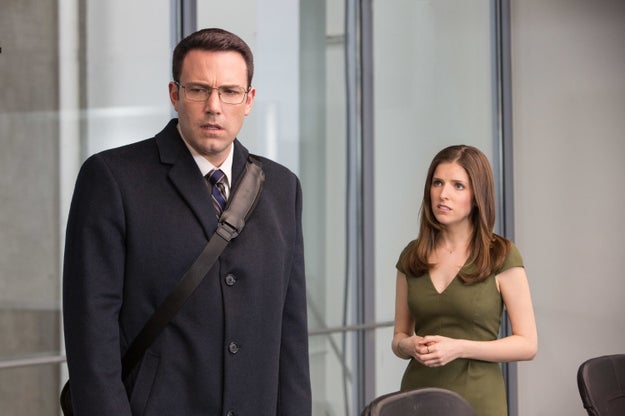
Ben Affleck and Anna Kendrick in The Accountant. Chuck Zlotnick / Warner Bros.
There’s a stand-up bit Ricky Gervais does about volunteering to take his neighbor’s autistic son out for the day as an act of celeb munificence. He tells the grateful, teary woman he’s bringing her child to the zoo, but, as soon as she’s out of sight, he steers his charge to a casino instead and tries to take advantage of the card-counting virtuosity he’s convinced the boy must have, thanks to Rain Man. The punchline is that Gervais finds himself down a few thousand pounds almost immediately, because despite what Dustin Hoffman’s Ray has etched in pop cultural memory, having autism is no guarantee of being a savant.
It’s an idea that movies still find seductive, though, a way of simplifying a spectrum of experiences into a trade-off — neurotypicality in exchange for selective genius.
That holds true for The Accountant, the new movie in which Ben Affleck plays a man named Christian Wolff whose self-described high-functioning autism is tantamount to a special power, making him not just a better mathematician but a better killing machine. Chris can take out a host of mobsters using their own weapons against them, and get you a decent tax write-off on your home business. He can process 15 years’ worth of corporate account ledgers in a single night, without the need for a computer. He also shoots a mean sniper rifle, and offers terse recommendations for more appropriate ammo to a man whose gun he takes.
Affleck generally and thankfully sticks to underplaying Chris, who, when the film begins, is hiding his illicit business behind a strip mall front in a small Illinois town. The actor squeezes his brawny bod into conservative businesswear, donning a pair of wire-rimmed glasses, and stopping just short of eye contact with his co-stars, including Anna Kendrick and Jon Bernthal. Chris lives alone, subjecting himself to a round of sensory overload each night as practice before allowing himself access to a space he’s more comfortable in. He does the books for all sorts of nefarious organizations, he has a mysterious handler helping him out on the phone, and he’s possibly secretly fighting for the forces of good, despite coming across as the financial equivalent of a high-end assassin. He is, essentially, an autistic superhero, one whose uniform of choice is a staid suit.
The Accountant, which is directed by Miracle’s Gavin O’Connor and written by The Judge’s Bill Dubuque, reveals its backstory in slow, looping coils, as if in hopes that will hide how little sense it makes when straightened out. It’s the kind of movie in which, for instance, J.K. Simmons blackmails a fellow Treasury agent (Cynthia Addai-Robinson) into helping him with something he could have just asked her to do, as part of a storyline that’s largely unnecessary anyway. The Accountant is also, begrudgingly, a pretty good time, especially once its solemnity gives way to its kitschy ode to familial pain, a story about a father who is determined to help his son learn to fight back against a world that won’t always understand him, rather than try to find his place in it.
O’Connor’s best movie is 2011’s Warrior, in which Joel Edgerton and Tom Hardy are brothers brawling out their displaced rage and childhood resentment in an MMA cage while their estranged drunk of a dad (Nick Nolte) plays coach. It’s a symphony of manly angst, years of pent-up rage and love channeled entirely through fists to the face, and The Accountant’s best moments recall it, especially in the flashbacks to Chris’s stern but well-intentioned father insisting his child toughen up rather than receive treatment to help him adjust. “The world,” he barks, “is not a sensory-friendly place.” Instead of working with a therapist, Chris (alongside his brother) is taught martial arts and is prompted to beat up bullies. He learns to self-soothe by muttering the nursery rhyme “Solomon Grundy” to himself in times of stress. He loses a father figure, and for added tragedy, acquires and then loses a second one.
The result is that, as an adult, Chris is lonely and isolated and possessed of a poetically bleak life (e.g., he owns a single set of silverware). But then, what superhero isn’t? As The Accountant winds its way through some plot in which Chris is hired to find who’s stealing money from a company owned by John Lithgow, what’s striking about this mostly silly film is how neatly Chris fits into a tradition of self-appointed screen vigilantes, caped or otherwise — the fact that the actor playing him is also our current Batman just underscores the similarity.
For years, action movies have been romanticizing characters who are hyper-focused, who find solace in routines, and who have difficulty making personal connections. It’s not the savant syndrome that’s The Accountant’s bright idea, it’s having a hero with autism in the first place, taking decades of stale clichés, tilting them on their side, and making us reconsider what they mean and what they can encompass.


